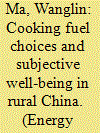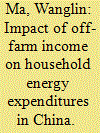| Srl | Item |
| 1 |
ID:
185721


|
|
|
|
|
| Summary/Abstract |
This paper examines the impacts of cooking fuel choices on individuals' subjective well-being, measured by happiness and life satisfaction, using open-access data from the 2016 China Labor-force Dynamics Survey. We analyze the impacts by employing a multivalued treatment effects model that accounts for selectivity bias. Unlike previous studies that consider households' binary fuel use decisions or specific fuel choices, we capture the households' fuel-stacking behaviors (using multiple fuels) by classifying cooking fuels into clean fuels, non-clean fuels, and mixed-fuels. The empirical results show that complete energy transition (i.e., switching from either non-clean fuels or mixed fuels to clean fuels) significantly improves individuals' happiness and life satisfaction. In comparison, incomplete energy transition (i.e., shifting from non-clean fuels to mixed fuels) does not significantly impact individuals' subjective well-being. A complete energy transition increases people's subjective well-being in the eastern and central parts of China but has no impact on those living in western China. Furthermore, switching from non-clean fuels to clean fuels significantly reduces happiness inequality and life satisfaction inequality. Switching to cleaner fuels also significantly increases individuals' self-reported health. We recommend that the government in China make concerted efforts to ensure access to affordable, reliable, sustainable, and clean energy sources and accelerate rural households' energy transition.
|
|
|
|
|
|
|
|
|
|
|
|
|
|
|
|
| 2 |
ID:
166315


|
|
|
|
|
| Summary/Abstract |
This study examines the impact of off-farm income on rural household energy expenditures, paying special attention to clean energies such as electricity and gas and non-clean energy such as coal. We use instrumental variable approaches to address the endogeneity issues of off-farm income and analyze household survey data collected from rural Gansu, Henan and Shandong provinces of China. Econometric results show that off-farm income promotes rural energy transition. In particular, off-farm income significantly increases both electricity and gas expenditures but decreases coal expenditure of rural households. Further analyses reveal that the energy transition effects generated by off-farm income are more pronounced for households in Shandong where the economy is relatively better developed relative to Henan and Gansu. Our findings highlight the importance of income diversification through off-farm activities by farm households to enhance clean energy accessibility and boost sustainable rural economic development.
|
|
|
|
|
|
|
|
|
|
|
|
|
|
|
|